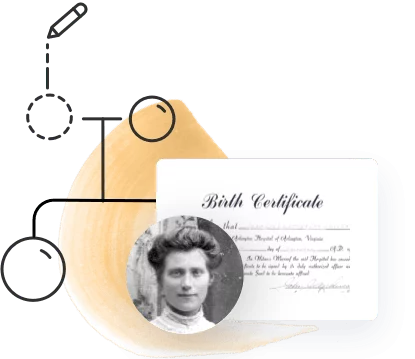
One of the most helpful and information-packed documents that you can locate for your ancestor is an obituary. Obituaries are short newspaper articles written within a few days after a person’s death. They are typically written by the deceased person’s children or other family members.
Details that may be included in an obituary:
- Full name of the deceased person
- Date and place of death
- Burial location
- Date and place of birth
- Names of parents
- Names of spouses
- Dates and places of marriages
- Names of living children, siblings, or other relatives (sometimes with current residence)
- Other details about the individual such as career, hobbies, community service, personality traits, church membership, cause of death, immigration information, etc.
When did obituaries first appear?
In most places in the United States, local newspapers began printing obituaries around the 1890s. Before the 1890s, there may have been a shorter death notice in the newspaper with fewer details. Death notices were typically printed starting in the 1860s, but time frames vary widely depending on location. The length of the obituary may be shorter in larger cities or in newspapers that didn’t allocate much space for obituaries in their particular newspaper.
Not everyone who died had an obituary printed in the local newspaper. However, it’s always worth doing a search for your ancestor’s obituary because it can contain valuable information.
How obituaries can help with genealogy
It can be helpful to locate an obituary not just for your direct ancestor, but also for the siblings, parents, spouse, and children of your ancestor, since obituaries may contain clues about other family members as well as the deceased person. Finding obituaries for the various members of the family can also give you interesting details about a family that you may not find elsewhere.
4 Ways to Locate an Obituary
There are various methods for locating an obituary:
1. Search MyHeritage’s newspaper collection
MyHeritage has a large digitized collection of newspapers. You can use the MyHeritage search engine to easily locate obituaries that mention your family members. Click here to search obituaries on MyHeritage.
2. Build or upload your complete family tree to MyHeritage
MyHeritage’s excellent Record Matching technology makes it possible to locate obituaries for your family members without even searching. MyHeritage uses the dates and places from your family tree to automatically locate records that mention your ancestor or their relatives, and that includes obituaries from their huge newspaper collection.
3. Look for an obituary in the digital newspapers online
Many historical U.S. newspapers are digitized online on a variety of websites. If you can’t find an obituary on one site, don’t assume that there wasn’t an obituary printed, as no site contains every newspaper.
A good way to find digital newspapers for a particular place is to do a Google search with the name of the state along with the county and/or city or town and the words “digital newspapers.” For example, if I’m looking for my ancestor’s obituary in Provo, Utah, I would do a Google search for “Provo Utah digital newspapers” or “Utah county digital newspapers.”
Another good way to find digitized newspapers and obituary index books is to use the LDSGenealogy.com U.S. records directory, which is organized by state, county, and city to help you locate records for a specific place.
4. Look for an obituary in newspapers that are not yet available online
There are still many U.S. historical newspapers that haven’t been made available online yet. However, even if the newspapers are not yet digitized, it’s likely that there are copies of the old papers from the place of your ancestor’s death in an archive or library. Copies in print or microfilm will not be searchable by name, which means you’ll have to search through the newspaper page by page. This will be very difficult and time-consuming unless you have an exact date of death to narrow down the search.
There are two good ways to locate newspapers in an archive or library:
1. Search the local public library
Locate the public library in the place where your ancestor died and see if they have newspapers available. Many public libraries in the United States have copies of historical newspapers for that area. Often they are not searchable by name, but the individual pages of the newspapers can be viewed in a paper or microfilm format.
Start with a Google search for the city or county where your ancestor died along with the words “public library” and find the website for the public library. Then look at the public library website to see if they have a local history or genealogy section.
Often library websites will list what newspapers they have available or give information about where the local newspaper for the area can be found online. If the website doesn’t specifically give information about newspapers, you can contact them and ask them directly as well. If the local library doesn’t have copies of the local newspapers, they may know where copies are currently located.
If the local library has newspapers available in a microfilm format, the staff at the library may be willing to look up your ancestor’s obituary on your behalf for a small fee. Or it may be possible to borrow a copy of the microfilm with the newspapers through interlibrary loan.
2. Use the U.S. Newspaper Directory
Another good way to locate a newspaper is to use the U.S. Newspaper Directory from the Library of Congress.
The Library of Congress has organized information on all of the historical newspapers published in the United States. You can search for a particular location and find out what newspapers were in print. The directory also includes information about archives where copies of the newspapers may be located. Once you have a specific newspaper title and an archive location, find the archive website to see what newspapers they have available.
More tips for locating an obituary
1. Be flexible with your digital searches
Many digital newspapers are searchable because the text has been digitized using OCR (Optical Character Recognition) technology. This technology scans the image, identifies the characters within the text, and converts them to digital text. However, it’s not perfect, and may not identify each character correctly, so the text you are searching may have some errors.
2. Try searching for surname only or for other relatives
If you know there is a newspaper available for the place and time period you are looking for, but you aren’t finding an obituary when you search for your ancestor’s name, try searching using just the surname or the names of the relatives of your ancestor as well. Women may be listed with their husband’s name rather than their own personal name (i.e., Mrs. John Smith). In some cases you may need to browse the images of the individual newspaper pages in order to locate the obituary if a search isn’t giving you the information you’re looking for.
3. Search newspapers from surrounding areas
Look in the newspapers from the surrounding area in addition to the specific town where your ancestor lived. If your ancestor lived in a smaller town or a more rural area, there may not have been a newspaper printed in that place, but there could have been newspapers printed in a larger town or city nearby. Also, sometimes there may be a death notice or an obituary in more than one local newspaper, and each newspaper may have somewhat different information.
4. Don’t limit yourself to obituaries
Newspapers can have all sorts of interesting information about your ancestor — not just in obituaries! If you locate digital newspapers for the area where your ancestor lived, it’s worth searching broadly within the newspaper to see what you can find out.
5. Share and preserve what you find
If you succeed in locating newspaper articles about your family, make sure to share them with your family and preserve them for future generations.
Click here to search MyHeritage’s digital newspaper collections.




